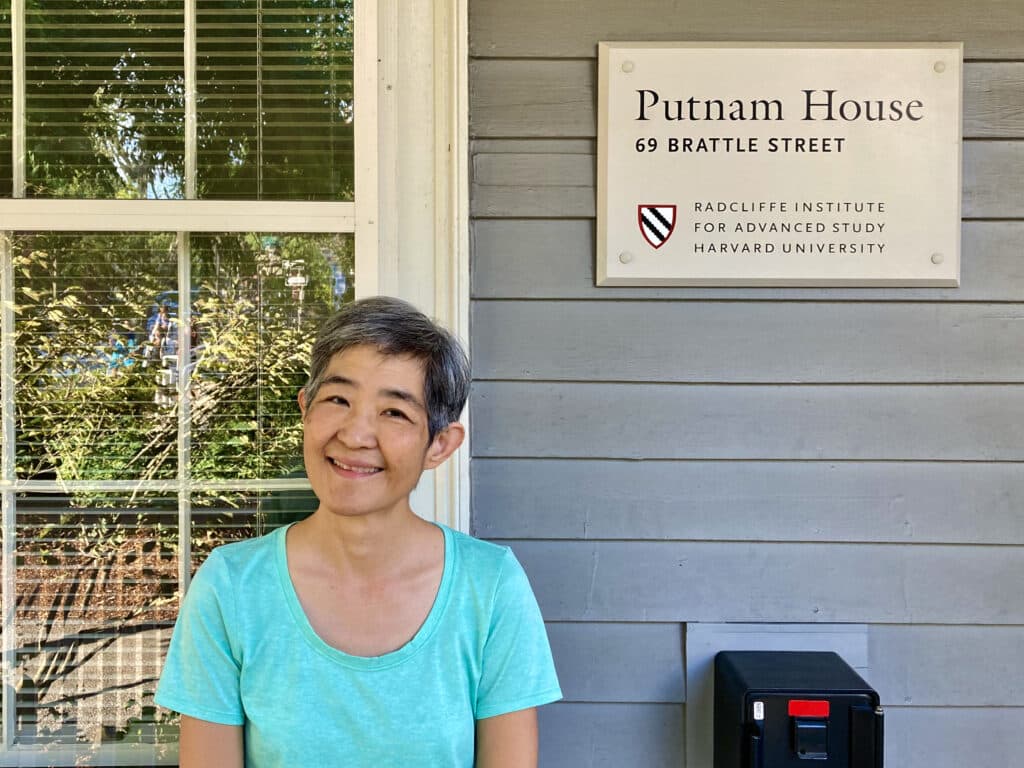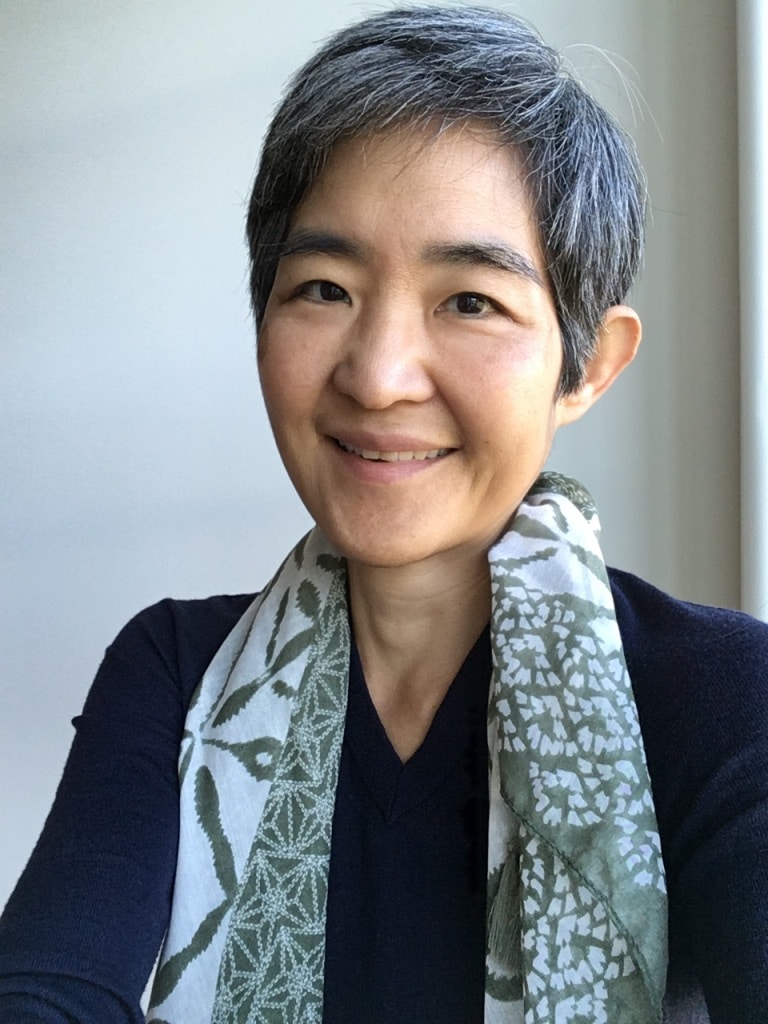
Are you a scholar, writer, artist, or researcher looking to take a break from your daily routine to work on an independent project while living in community with other interdisciplinary professionals? The Harvard Radcliffe Institute Fellowship may be the perfect opportunity for you!
Based in Radcliffe Yard — a sanctuary in the heart of Harvard University — this nine-month paid residency provides Fellows with access to Harvard University’s unparalleled resources, which includes mentorship from Harvard professors in their field and the ability to network and participate in workshops with other Fellows. Fellows are expected to be free of their regular commitments so they may fully devote themselves to the work outlined in their proposal.
We spoke with Joan Najita, an astronomer at the National Science Foundation’s NOIRLab who is currently conducting research through the Harvard Radcliffe Institute Fellowship, to learn more about a day in the life of a Radcliffe Fellow and how this “once-in-a-lifetime experience” is advancing her personal and professional goals.
The application to join the next cohort of Harvard Radcliffe Institute Fellows is now open! The deadline for applications in humanities, social sciences, and creative arts is September 8, 2022. The deadline for applications in science, engineering, and mathematics is September 29, 2022.
Tell us about your research and professional journey. What led you to the Harvard Radcliffe Institute Fellowship?
Joan: I’m an astronomer who studies the origins of stars and planets, both those in the Solar System and beyond. Most of the time, I work at the National Science Foundation’s NOIRLab, the US center for ground-based optical and infrared astronomy. As a staff astronomer, I carry out astronomy research and support the US professional astronomy community. While I love the work I do, every decade or so, I get the sense that it’s time to move on: to branch out in a new research direction, explore new a path, and think new thoughts.
This time was no different. I had so many aspirations and goals. I wanted to have the freedom to take a new look at an old problem in planet formation. I wanted to see what new science I could investigate with a new spectroscopic research facility that has just come into operation. I wanted to better connect the work I do with the public. And I wanted to examine the ethics of astronomy research in the context of society.
These goals would be challenging to carry out at NOIRLab. My service activities often leave little time for research, and new directions often require a lot of time to learn and consult with experts in other fields. I applied for the Radcliffe Fellowship to have the freedom to explore these new directions and to be inspired by a supportive community of researchers and artists.
Can you describe what a week in the life of a Harvard Radcliffe Institute Fellow is like? How has this opportunity allowed you to advance your research and career?
Joan: Each week, the Radcliffe Fellows — a diverse group of scientists, writers, scholars, public intellectuals, practitioners, and artists — get together to share their work in progress. There are two talks per week, and each Fellow gives one presentation during the academic year. The talks are fabulous opportunities to learn about topics beyond your own area of interest, see how other Fellows look at the issues and problems in their discipline, the problems we face as a society, and how they confront these challenges to make a difference in the world.
The talks are also an opportunity to get to know the Fellows as individuals and colleagues. In my Fellowship year, the discussion following one Fellow’s talk brought to light a common hierarchy of “ways of knowing” across academia and the arts, an intriguing connection that we’re continuing to explore.
Apart from the talks, the rest of the week is completely open for Fellows to pursue their own work. The Fellows’ offices in Byerly Hall offer a peaceful, quiet space for deep thinking and productive work, far from the usual interruptions and demands of our lives when we’re not at Radcliffe. And when you’re ready to interact with other Fellows, the coffee machine on the first floor is a strong attractor and a gathering place for a stimulating chat or the start of a longer conversation. Radcliffe also organizes activities, field trips, and events that bring the Fellows together. Fellows also organize their own events for fellowship and fun.
As a Harvard Radcliffe Institute Fellow, you can participate in the Radcliffe Research Partners program, an opportunity to work with one or more Harvard undergraduates on a topic you propose. With you as a mentor, the students provide research assistance, learn useful research skills, and have a chance to engage with you on an interesting project.
NOIRLab doesn’t have students, so the Research Partners Program was a special opportunity for me. I met weekly with two sets of talented undergraduates. In one project, we explored a new data set on the Andromeda Galaxy, our nearest galactic neighbor. The enthusiasm and interest of the students were vital in inspiring me to dive into what was for me a new field of research. In the other project, the students and I explored a topic that I knew relatively little about: conflicts between indigenous rights and the development of scientific research facilities. In this project, the students were my teachers! It was a unique opportunity to explore a wide range of issues and gain a deeper understanding of other perspectives.
There are yet more opportunities if you’re interested. As the Harvard Radcliffe Institute Fellowship is based in Radcliffe Yard on the Harvard University campus, you’re just steps away from all that Harvard has to offer, including its libraries, world-renowned departments and scholars, and other resources. As a Fellow, I joined weekly reading groups in the Astronomy and Earth and Planetary Sciences, attended department talks and colloquia, and got to know students, postdoctoral scholars, and professors. These interactions led to new research insights, connections, and friendships.
The Harvard Radcliffe Institute Fellowship is a community of scholars, researchers, artists, and scientists. What was it like connecting with so many diverse intellectuals from around the world? How did this exposure to different ideas and talents play a role in your research?
Joan: In real life, back at NOIRLab, I pretty much only interact with other astronomers. Moreover, most of my interactions are with people within my specialty (star and planet formation). Interacting with experts in your own subfield is great to delve into the details, but it can also shrink your worldview quite a bit. Even though NOIRLab is located on the campus of a university (University of Arizona), it’s rare to explore beyond the borders of Astronomy.
In contrast, Radcliffe creates an environment in which it’s easy to meet and interact with diverse intellectuals. The Fellows’ offices are all in one building, and the talks and events bring the Fellows together regularly. The best part is that it’s a community! The other Fellows are supportive and are interested in reaching out and interacting.
Seeing how other Fellows have challenged conventions, faced huge personal obstacles, tackled important problems facing society, the list goes on — it’s all incredibly inspiring. The Fellowship experience inspires me to take more chances, follow my interests, and go beyond the borders I’ve set for myself.
As one example, it’s traditional in science to take the personal and the human elements out of the story. That may make sense for scientific publications, but other kinds of communications could really benefit from a more humanizing approach that makes stronger connections between science and society and makes science interesting at a human level. I’m inspired to find my own way in those directions.
What advice do you have for other scholars who plan to apply to the Harvard Radcliffe Institute Fellowship?
Joan: First, I completely endorse your plan to apply for the Fellowship. It is a terrific, perhaps once-in-a-lifetime opportunity. While the Fellowship offers you the freedom to do your own work in peace and quiet, it also offers the chance to interact with a vibrant and supportive community of Fellows who make the Fellowship really special.
My advice is to be open to the possibilities that come from interacting with such a diverse group of people, but also to protect your time during the Fellowship. Be firm in turning down requests to serve on committees or review articles or books. Those requests (or their equivalents) will still be there when the Fellowship ends, something that happens all too quickly!
Joan Najita is an Astronomer at NOIRLab, the National Science Foundation’s
Seeking a break from your daily routine? Check out Paid Fellowships for Your Mid-Career Sabbatical.
© ProFellow, LLC 2022, all rights reserved.